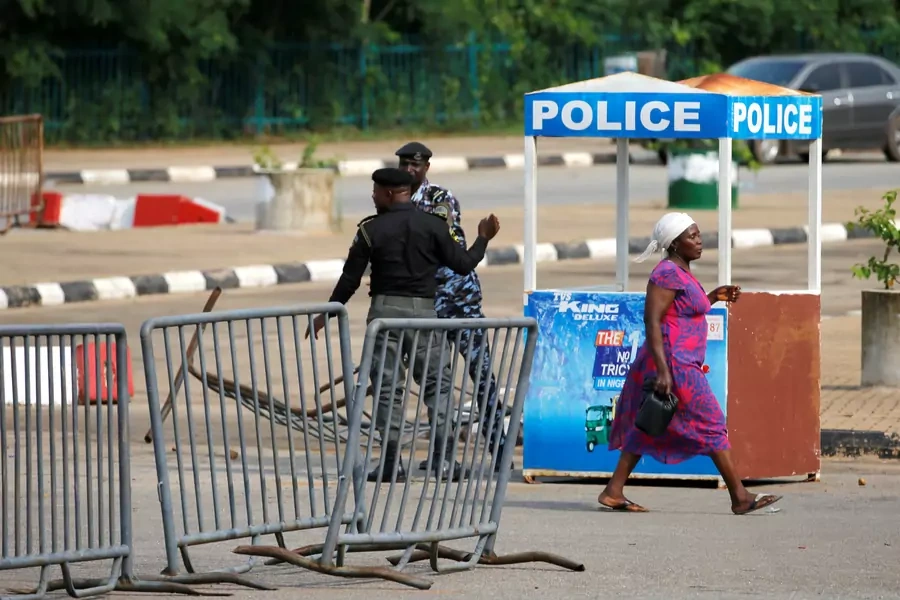More Trouble Between Nigeria’s Shia Minority and the Police

Western and Nigerian media are reporting that the principal Shiite movement in Nigeria, the Islamic Movement of Nigeria (IMN), “stormed” the National Assembly in Abuja on July 7. In the resulting melee, two people may have been killed and eight injured. As is so often the case, there are few details, with claims and counter-claims. But, the episode is a reminder that Shiites are a force now to be reckoned with in Nigerian street politics.
Spokesmen for the group say that their delegation was seeking to enter the National Assembly peaceably to protest the continued detention of their leader, Sheik Ibrahim el-Zakzaky, who has been under arrest since 2015. The Shia are saying that the police killed two protestors. The police are saying that they used “minimum force,” and that two of their officers were shot in the leg and six others were hurt by clubs and stones. Nigerian media, apparently hostile to the Shia, is saying that the protestors killed two National Assembly guards, burned three vehicles, and “destroyed many others.” Neither the deaths claimed by the Shia nor the casualties claimed by the police have been independently verified.
More on:
Nigeria’s Shia minority, some of whom are organized with the IMN, oppose the very existence of Nigeria’s secular government. They also claim to be peaceful, and their leadership does not advocate violence. Current Shia grievances focus on the continued detention of Zakzaky, who faces murder charges brought by Kaduna state. (If convicted, he would face the death penalty.) Complicating the issue of Zakzaky’s imprisonment is that he stands accused by the Kaduna state government of murder, but he is imprisoned by the Federal government. Federal spokesmen have said that he cannot be released until his case is disposed of by the Kaduna courts.
Since Zakzaky’s arrest, there have been regular Shia protests, some of which have been violent and with police over-reaction. In October 2018, IMN supporters clashed with police in and around the capital, and at least forty Shia marchers were killed. The Abuja melee on July 7 appears to fit that pattern. Iran, whose Shia-dominated government has assisted the Nigerian Shias, periodically protests Zakzaky’s continued confinement.
The murder charges stem from an incident in Zaria in December 2015. Federal and military spokesmen say that a Shiite mob led by Zakzaky attempted to assassinate Nigeria's Chief of Army Staff Tukur Buratai when they blocked his convoy. Buratai was not killed, but the formal charges against Zakzaky accuse him and his followers of killing at least one soldier by name. In the aftermath, the army attacked IMN facilities, killing hundreds of people, including members of Zakzaky’s family. Zakzaky and his wife were seriously wounded in the attack and arrested. The IMN vociferously denies that there was any assassination attempt.
Like Boko Haram, the IMN sees the secular state as evil and wants an Islamic state based on Islamic law. The group is hostile to any Western influence, including in education. It is also hostile to Nigeria’s traditional political and religious elite. For the IMN, its model is the post-revolutionary Iranian Islamic state. In turn, the traditional Nigerian Islamic establishment despises the Shia. Despite certain similarities, the IMN and Boko Haram are anathema to each other. The IMN is opposed to Boko Haram’s use of violence and Zakzaky has claimed, implausibly, that it is a creation of the “oil-hungry west.” As with other Sunni radical movements in the Middle East, Boko Haram is especially hostile to Shias. The extent of Iranian financial and other support for Nigerian Shias in general and IMN in particular is unknown.
Nobody really knows the size of the Shiite population in Nigeria. Credible estimates that its numbers range between 2 and 3 percent of Nigeria’s population, which would amount to roughly four million. Zakzaky has claimed at different times to have followers ranging from a few hundred thousand to three million; not all Nigerian Shias are associated with IMN. Whatever IMN’s numbers, were Zakzaky to be tried, convicted, and executed—the worst-case scenario—Abuja could very well face the black swan of a Shiite insurrection.
More on:
 Online Store
Online Store